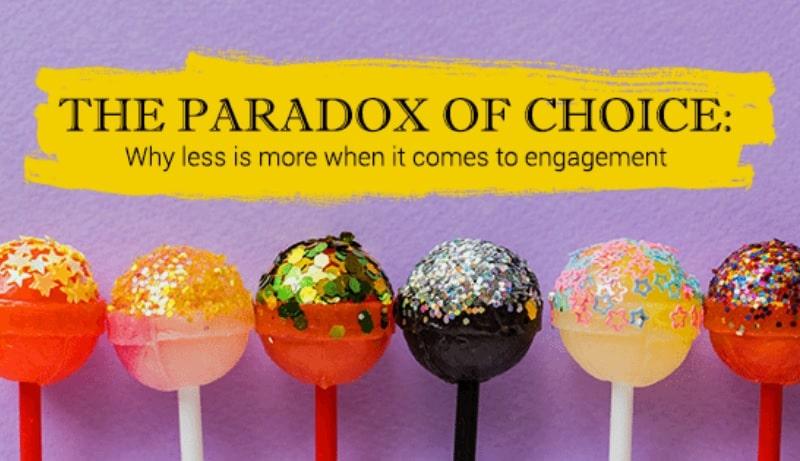Paradox of choice: why less is more!
Researcher and author, Barry Schwartz, has made a name for himself by promoting a theory we all have experience with whether we know it or not: the “Paradox of choice“.
Paradox of choice
The paradox of choice is our inability to choose when presented with a lot of options, even though we like to have plenty of choices. The more to choose from, the harder the choice and the less satisfied you are with your choice.
Why less is more!
Choice is overwhelming. It requires work. While it seems that the more diverse the menu at dinner, the more freeing the eating experience should be, the opposite is really true. If the menu is set, you don’t have to think about it. And that freedom, freedom from the stress of decision making, is worth more than we think.
Back in the day, our grandparents had a limited pool of options for who they could date. Without the internet, they had to rely on meeting people in-person and the number of single people they met within a suitable age-range was not very large. These days, dating apps like Tinder have changed the game. However, with so many possibilities for a partner right at your fingertips, so too enters the paradox of choice. How do you pick one person to date when there are so many other options out there that might be better?
Want to enjoy a movie or series to the fullest. You start browsing through what Netflix has to offer. At some point, you get overwhelmed by the amount of choice and after 30 minutes you’re still at the point of wandering around in the Netflix catalogue. Perfect example of what Barry Schwartz calls the paradox of choice, the idea that more choice leads to more psychological stress and less happy feelings.
The paradox of choice leads us to the diversity of our choices that cause us stress and, ultimately, a feeling of trapped unhappiness.
Paradox of choice and the sweet spot
Does the whole idea of a paradox mean that the best thing to do is give no choice at all? No. Schwartz discovered a so-called sweet spot in the paradox of choice. The point where the number of choices is most effective on our subjective well being.

Applying this knowledge to consumer choice shows that a larger assortment of products like jam, chocolate or even pension plans results in less motivation to actually buy the product. The trick is now to find that sweet-spot: where you offer not too little, but also not too much.
Final Takeaways
Having an abundance of choices makes it much easier for us to blame ourselves for not making the right decision. We tend to regret our actions, and feel anxious and stressed. As a result, there is a decrease in our satisfaction after making a choice. The sad part is that we can never know if our chosen option was ‘the’ option without trying everything out there. We may be disturbed by this uncertainty, and by knowing that there may always be a better option.
Limiting the choices to a manageable number, having the discipline to focus on the important ones and ignoring the rest, ultimately derives greater satisfaction from the choices you have to make.
Books that help :
The Paradox of Choice: Why More Is Less ( https://amzn.to/3sWdcej )
The Intelligence Paradox: Why the Intelligent Choice Isn′t Always the Smart One ( https://amzn.to/3ztMFGL )
The Paradox of the World: Sermons ( https://amzn.to/3qTT5ep )
Read more : How to fix Revenge Bedtime Procrastination ( https://thebrightdelights.com/how-to-fix-revenge-bedtime-procrastination/ )
